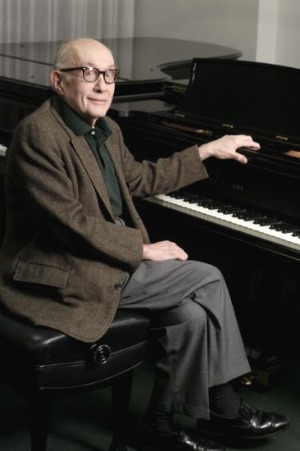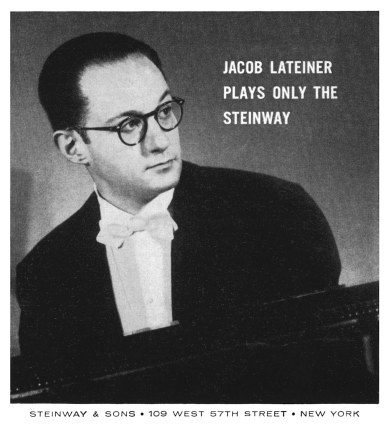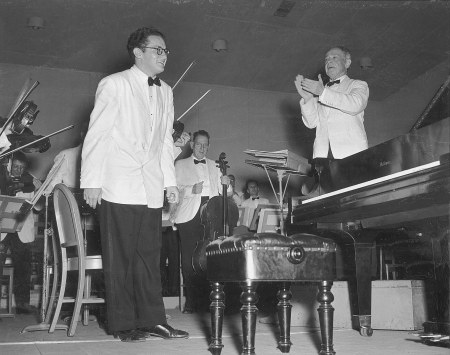Jacob Lateiner died this morning in New York. He was 82. The following passages are from my 1998 essay about his teaching:
 “In a sense, Jacob Lateiner does not give piano lessons. The piano is a tool for him. It’s a means or an obstacle to singing, speaking, and (fuga!) flying. In lessons, Jacob aims to be neutral. Part Socratic (or Talmudic?) questioner, part Freudian analyst (to the exactly punctual end of each session), Jacob allows his students their own paths and destinations. He is catalyst, guide, and dowser. And when his students do make music through the piano, Jacob bears witness…
“In a sense, Jacob Lateiner does not give piano lessons. The piano is a tool for him. It’s a means or an obstacle to singing, speaking, and (fuga!) flying. In lessons, Jacob aims to be neutral. Part Socratic (or Talmudic?) questioner, part Freudian analyst (to the exactly punctual end of each session), Jacob allows his students their own paths and destinations. He is catalyst, guide, and dowser. And when his students do make music through the piano, Jacob bears witness…
“How much of Jacob’s teaching was intuitive and how much the result of careful consideration? In the end, I believe, it is like his relationship to music itself. Intuition leads to questions and understanding which reinforces the intuition he starts from … Jacob rejected the notion that interpretive ideas could be copied from famous performers. He was a leader in a generation of pianists who regarded the composer, represented by the musical text, as its highest authority. Jacob’s well-known argument with Serge Koussevitzky is evidence of the way the performer’s role was evolving. During rehearsals for his debut with the Boston Symphony in 1947, the nineteen-year-old Jacob disagreed rather  fiercely with the celebrated conductor about the tempo for the second movement of Beethoven’s so-called “Emperor” Concerto. Jacob wanted the movement to be in two, as Beethoven marked. (The “tradition” of playing this music with four slow beats in each measure was reinforced by the erroneous 4/4 meter marking found in the orchestral parts then widely in use…
fiercely with the celebrated conductor about the tempo for the second movement of Beethoven’s so-called “Emperor” Concerto. Jacob wanted the movement to be in two, as Beethoven marked. (The “tradition” of playing this music with four slow beats in each measure was reinforced by the erroneous 4/4 meter marking found in the orchestral parts then widely in use…
“There are many times I feel that everything I understand about music or piano playing springs from Jacob Lateiner — was colored and ennobled by him. How can I ever express adequate thanks or gratitude? No words will do it. Perhaps, if some of my performances (or even fleeting moments of them) suggest the level of aspiration he revealed, or approach the intensity and range of musical communication he cultivated, then that might be worthy tribute. I try to offer it every time my hands touch the piano to make music.”

Jacob Lateiner with Serge Koussevitzsky at Tanglewood,1947

I heard Lateiner play Beethoven’s “Waldstein” Sonata at the Metropolitan Museum. It was an uncanny combination of fastidious virtuoso playing and white heat. As if he were just making it all up — as if that would even be possible!
I assume many will chime in about meals in the Moon Palace. Me, too.
He was also a most accomplished backseat driver.
In the past 25 or so years we lost touch as I left New York City, then State. We had running musical gags and disputes for maybe 50 years. I’d contact him on occassion, either directly or through a friend and, no matter how oblique or ancient the reference, he always got it and struck back.
And one hell of a musician. I remember a live “Tempest” at some out-of-the-way summer venue, played on a misbehaving Yamaha, that convinced me completely.
The rest are cliches.
Steve Smolian
He was my greatest musical influence and I cherish every moment I spent in his presence. Not only was he a great teacher but also an inspiring person with wonderful obsessions (autograph/first edition addiction, art of coffeemaking, Chinese food to name a few.)
His musical insight was truly astonishing, he gave me the tools for my life as a musician.
I feel in his later life he did not quire fit into the music world as it is run, he was certainly living in a world of his own.
A great loss for those who knew him.
I remember vividly his seminar on Beethoven at Juilliard, and also on attending chamber music coachings with him. His very clear and carefully studied interpretation of Beethoven, both theoretically and then in practise, still influence me profoundly. A great musician, and a kind man – he will be much missed.
I read of Mr. Lateiner’s passing in the New York Times this afternoon, just as I’ve been putting last-minute touches on the Beethoven Op. 31, No. 1 for a radio broadcast tomorrow. Like Claudia, I remember taking his graduate Beethoven seminar, which left me with far more questions than answers; I suspect that was exactly the effect he had in mind for the course. (I think your use of the word Talmudic to describe his approach is exactly right.) There was a time when I might have thought it a bit too fussy to spend the time he did delving into manuscripts and first editions. Now, I continually find myself looking up those very things at the Beethoven Haus Bonn website, and catch myself thinking that Mr. Lateiner managed to get under my skin with his passions, after all. There was certainly no-one like him at the Juilliard we knew as students, but I hope his influence lives on there, and elsewhere.
Back in the late 1960s when I was the concertmaster of the Minnesota Orchestra Jakob Lateiner soloed with us in the Elliott Carter Piano Concerto. Mr. Lateiner’s pioneering spirit was evident on that occasion as he braved the many incomprehensibilities of that work and brought it to the audience in a form that would have no doubt lacked something if he had not been at the helm. Talmudic best wishes to him wherever he may be as well as happy Beethoven’s birthday. Isidor Saslav
As a second comment: I was struck by the alla breve incident in the second movement of the Emperor Concerto and the Boston Symphony in 1947. This problem is evident in the Haydn string quartets as well. The first movement of the Op. 77/1 in its original form is also in alla breve which subsequent editors, as in the Beethoven, changed to normal 4/4, thus slowing it down considerably, to which Mr. Lateiner so appropriately objected. According to an old 18th-century tradition an alla breve in a slow movement signified to the performer that the normal slowness should be mitigated by a somewhat faster tempo though not necessarily in two.
I will miss you forever…
from your sweet pupil mijin